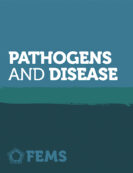Pathogens and Disease Poster Prize: Francis Cavallo
We send our congratulations to Francis Cavallo, who won a poster prize at the FEMS Conference on Microbiology. This award is sponsored by our journal Pathogens and Disease.
The FEMS Conference on Microbiology (#FCOM22) took place on the 30th June until the 2nd July in Belgrade, Serbia. With 450 posters on display the Pathogens and Disease editorial board selected Francis poster on bacterial resistance to predation by Bdellovibrio bacteriovorus as the best poster.
Read our interview with Francis about his research below:
What is your current position, and what was your scientific journey to get there?
My research focused on understanding antibiotic resistance, with particular focus on bacterial predators and their uses. My academic career started with a Bachelor’s in Biotechnology from the small Italian University of Potenza, followed by a Master’s at the Royal Institute of Technology in Stockholm, Sweden. I recently completed my education by earning my Ph.D. in Microbiology at the University of Groningen.”
Could you describe the research your poster covered?
My poster investigated possible factors that determine bacterial resistance to predation by Bdellovibrio bacteriovorus, a bacterial predator which preys upon other Gram-negative bacteria. The study investigated the involvement of core Lipopolysaccharides (LPS) of Escherichia coli prey. In the present context of rising antibiotic resistance to conventional chemical antibiotics, the natural ‘antibiotic’ characteristics and molecules from organisms such as B. bacteriovorus could be exploited for the research of new and alternative antimicrobial molecules.”
What do you hope to focus your research on in the future?
I would like to keep investigating the mechanisms that allow bacteria to acquire resistance. In my opinion antibiotic research needs to shift from purely chemical solutions to more biological ones. Taking advantage of ‘alive’ antibiotics that evolve and adapt to the prey that they target constitutes a cutting edge in favor of natural antibiotics.”
–
We use income from the FEMS Journals to fund grants, awards, and projects, and to support our knowledge sharing events and initiatives. Consider publishing your research with our journals to help the global microbiology community.
All but one of the FEMS journals are fully open access (OA), with one journal, FEMS Microbiology Letters, offering free-to-publish and OA options. Open access is key to supporting the FEMS mission of disseminating high quality research as widely as possible: when high quality, peer reviewed sound science is open access, anyone, anywhere in the world with an internet connection, can read it.







